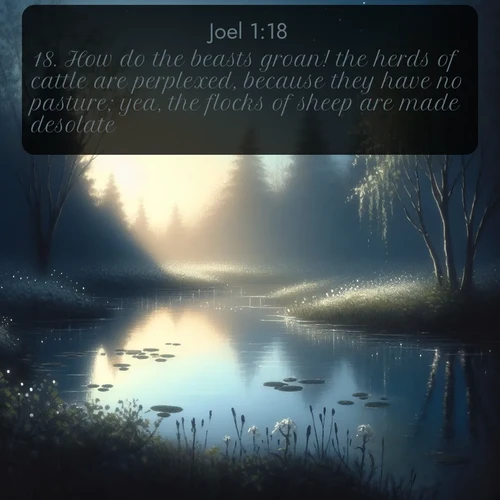Joel 1:18 plusieurs versions / traductions
English Bible Translations
18. How do the beasts groan! the herds of cattle are perplexed, because they have no pasture; yea, the flocks of sheep are made desolate.
18. How do the beasts groan! the herds of cattle are perplexed, because they have no pasture; yea, the flocks of sheep are made desolate.
18. What sounds of pain come from the beasts! the herds of cattle are at a loss because there is no grass for them; even the flocks of sheep are no longer to be seen.
18. How do the beasts groan! The herds of cattle are bewildered, for they have no pasture; the flocks of sheep also are in suffering.
18. How do the beasts groan! the herds of cattle are perplexed, because they have no pasture; yes, the flocks of sheep are made desolate.
18. How have cattle sighed! Perplexed have been droves of oxen, For there is no pasture for them, Also droves of sheep have been desolated.
German Bible Translations
18. O wie seufzt das Vieh! Die Rinder sehen kläglich, denn sie haben keine Weide, und die Schafe verschmachten.
18. O wie seufzt das Vieh, wie sind die Rinderherden verstört, weil sie keine Weide haben; auch die Schafherden gehen zugrunde!
French Bible Translations
18. Comme les bêtes gémissent! Les troupeaux de boeufs sont effrayés parce qu'ils n'ont plus de pâturage, et même les troupeaux de brebis dépérissent.
18. Comme les bêtes gémissent! Les troupeaux de bœufs sont consternés, Parce qu’ils sont sans pâturage; Et même les troupeaux de brebis sont en souffrance.
18. Comme les bêtes gémissent! Les troupeaux de boeufs sont consternés, Parce qu'ils sont sans pâturage; Et même les troupeaux de brebis sont en souffrance.
18. Comme le bétail gémit! Les troupeaux de gros bétail sont déconcertés, car il n'y a pas de pâturage pour eux; les troupeaux de menu bétail aussi sont en peine.
18. Ô combien ont gémi les bêtes, et dans quelle peine ont été les troupeaux de bœufs, parce qu'ils n'ont point de pâturage! Aussi les troupeaux de brebis sont désolés.
18. Comme le bétail gémit! Les troupeaux de bœufs sont consternés, parce qu'ils n'ont point de pâture; même les troupeaux de brebis en souffrent.
Versions with Strong Codes
Joel 1 / KJV_Strong18.
Strong Code definitions
H4100 mah maw or mah {mah}; or ma {maw}; or ma {mah}; also meh {meh}; a primitive particle; properly, interrogative what? (including how? why? when?); but also exclamation, what! (including how!), or indefinitely what (including whatever, and even relatively, that which); often used with prefixes in various adverbial or conjunctive senses:--how (long, oft, (-soever)), (no-)thing, what (end, good, purpose, thing), whereby(-fore, -in, -to, -with), (for) why.
H929 bhemah be-hay-maw' from an unused root (probably meaning to be mute); properly, a dumb beast; especially any large quadruped or animal (often collective):--beast, cattle.
H584 'anach aw-nakh' a primitive root; to sigh:--groan, mourn, sigh.
H5739 `eder ay'-der from H5737; an arrangement, i.e. muster (of animals):--drove, flock, herd.see H5737
H1241 baqar baw-kawr' from H1239; beef cattle or an animal of the ox family of either gender (as used for plowing); collectively, a herd:-- beeve, bull (+ -ock), + calf, + cow, great (cattle), + heifer, herd, kine, ox.see H1239
H943 buwk book a primitive root; to involve (literally or figuratively):--be entangled, (perplexed).
H3588 kiy kee a primitive particle (the full form of the prepositional prefix) indicating causal relations of all kinds, antecedentor consequent; (by implication) very widely used as a relative conjunction or adverb (as below); often largely modified by other particles annexed:--and, + (forasmuch, inasmuch, where-)as, assured(-ly), + but, certainly, doubtless, + else, even, + except, for, how, (because, in, so, than) that, + nevertheless, now, rightly, seeing, since, surely, then, therefore, + (al- )though, + till, truly, + until, when,whether, while, whom, yea, yet.
H369 'ayin ah'-yin as if from a primitive root meaning to be nothing or not exist; a non-entity; generally used as a negative particle:--else, except, fail, (father-)less, be gone,in(-curable), neither, never, no (where), none, nor, (any, thing), not, nothing, to nought, past, un(-searchable), well-nigh, without. Compare 370.see H370
H4829 mir`eh meer-eh' from H7462 in the sense of feeding; pasture (the place or the act); also the haunt of wild animals:--feeding place, pasture.see H7462
H1571 gam gam properly, assemblage; used only adverbially also, even, yea, though; often repeated as correl. both...and:--again, alike, also, (so much) as (soon), both (so)...and , but, either...or, even, for all, (in) likewise (manner), moreover, nay...neither, one, then(-refore), though, what, with, yea.
H5739 `eder ay'-der from H5737; an arrangement, i.e. muster (of animals):--drove, flock, herd.see H5737
H6629 tso'n tsone or tsaown (Psalm 144:13) {tseh-one'}; from an unused root meaning to migrate; a collective name for a flock (of sheep or goats); also figuratively (of men):--(small) cattle, flock(+ -s), lamb (+ -s), sheep((-cote, -fold, -shearer, -herds)).
H816 'asham aw-sham' or mashem {aw-shame'}; a primitive root; to be guilty; by implication to be punished or perish:--X certainly, be(-come, made) desolate, destroy, X greatly, be(-come, found, hold) guilty, offend (acknowledge offence), trespass.
Prédications qui analysent les thèmes Joël 1
Thèmes : Le cri de la vraie pitié; Le fléau des sauterelles; L'appel à la repentanceJoël 1 : Et ça ne change rien !
Related Sermons discussing Joel 1
Themes : Le cri de la vraie pitié; Le fléau des sauterelles; L'appel à la repentancesee also: Bible Key Verses ; KJV Bible Images, BBE Bible images

